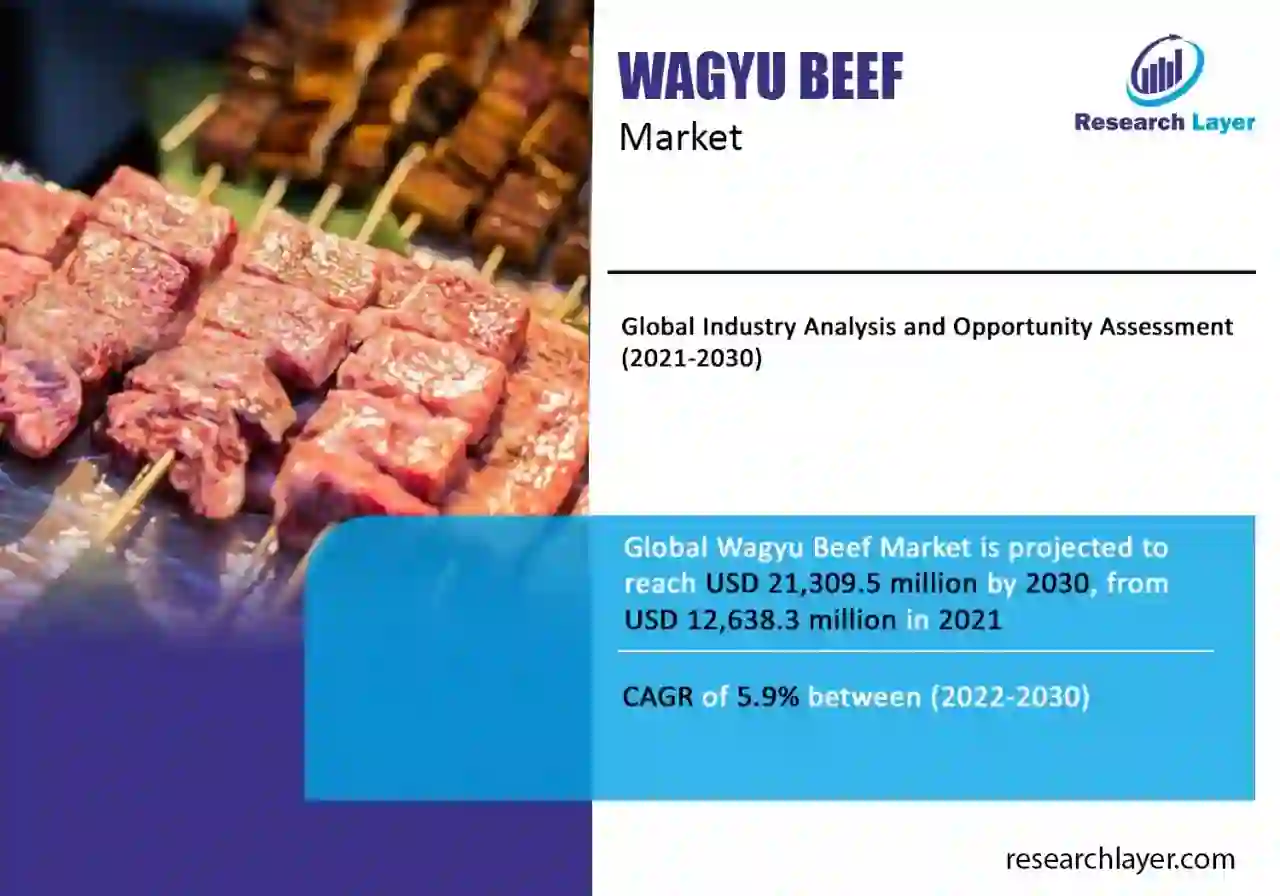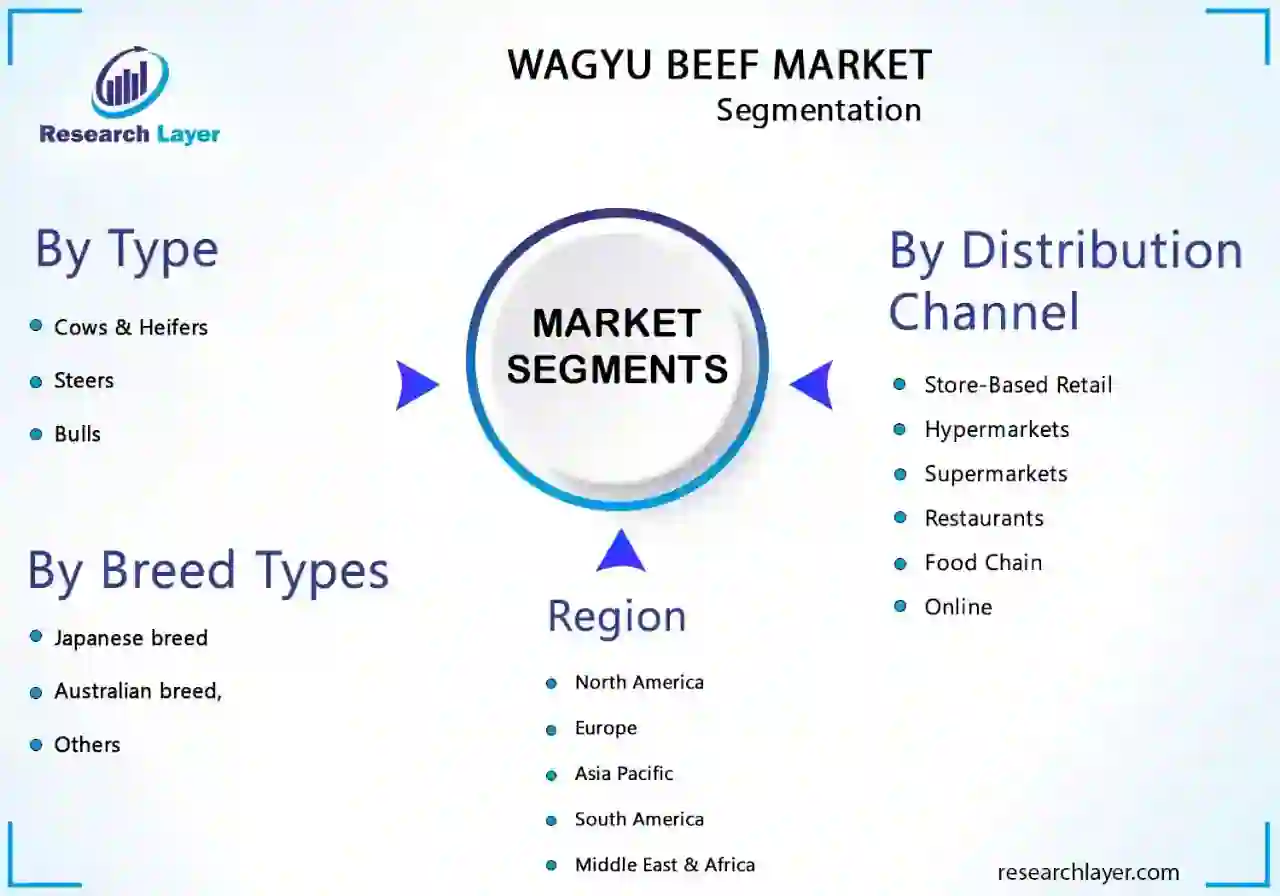 +1 915 229 3004 (U.S.) |
+1 915 229 3004 (U.S.) |  +44 7452 242832 (U.K.)
+44 7452 242832 (U.K.)
 +1 915 229 3004 (U.S.) |
+1 915 229 3004 (U.S.) |  +44 7452 242832 (U.K.)
+44 7452 242832 (U.K.)

The global wagyu beef market is projected to reach USD 21,309.5 million by 2030, from USD 12,638.3 million in 2021, and is anticipated to register a CAGR of 5.9% between 2022 and 2030.


Download Free Report Sample to learn more about this report.
A Japanese beef cow breed that has been altered from Asian cattle is known as wagyu. It differs from other forms of beef in specific ways that make it more delicate and flavorful. As customers have become health-conscious and self-aware, they like to buy only quality items rich in nutrients.
Products made from wagyu beef, such as crossbreed, wagyu & Kobe, and 100% full-blood wagyu, are considered exceptionally healthful worldwide. During the global enforced shutdown, businesses that produce and export wagyu beef products have experienced difficulties in R&D, production, and supply chains. The ban on domestic and international import-export caused wagyu beef demand in the importing states to skyrocket, resulting in a stockpile of orders. Manufacturing plants resumed operation at 90% to 100% of capacity when the lockdown was released in order to fulfill the enormous demand. Still, the import-export embargo had already disrupted the supply chain up until that point.
Since the COVID-19 viral breakout in January 2020, the disease has badly expanded to almost all of the world's nations, prompting the World Health Organization to declare a public health emergency. Flight cancellations, travel bans, quarantines, restaurant closures, restrictions on all indoor activities, huge supply chain slowdowns, stock market volatility, low corporate morale, rising public dread, and uncertainty about the future are just a few of the effects of this outbreak. In addition, the recession and job losses are driving significant changes in consumer behavior and severe disruption in the sales channel for wagyu beef products on the international market.


Download Free Report Sample to learn more about this report.
Based on distribution channel, the wagyu beef market is segmented into store-based retail, hypermarkets and supermarkets, restaurants & food chain, and online. By distribution channel, the store-based retail sub-segment is the largest contributor in the global wagyu beef industry.
The global retail food industry for Wagyu beef and related goods is highly developed and highly fragmented, with numerous prominent regional players occupying about 70% of the store-based retail sector. Knowing where food comes from is crucial for Americans, Australians, and Japanese. Wagyu consumers as these nations rely so much on imports. The store-based retail sector, where customers interact directly with international suppliers thanks to the necessary "country of origin" (COO) labeling legislation, is a crucial platform for Australia to promote quality supported by product integrity. The main drivers of the store-based retail industry are the rising number of brick-and-mortar retailers worldwide, many of which offer different Wagyu beef brands at reduced costs and in bundle offers. The development of store-based retail is accelerating the segment's growth by meeting the rising demands of the new generation and health-conscious customers.
Rapidly Flourishing Luxury Hospitality Sector
While the retail consumer market is the backbone of the mass meat industry, particularly beef brands, wagyu beef brands primarily target institutional consumers like hotels, hotel chains, and high-end restaurant brands and thrive on their backs. In line with our findings, institutional B2B clients account for around 85% of wagyu beef sales. Numerous wagyu beef firms have worked with hotel chains, restaurant groups, and specialty eateries that are present in airports, upscale malls, big-box stores, and major cities. Companies selling wagyu beef are now available through various B2C distribution channels. However, businesses are now now focusing on high-end superstores and high-end online retail platforms. As a result, the sales approach is today heavily influenced by B2B and restaurant food chains. Hotels, restaurants, airports, and online retail are currently the top four industries in emerging and developing nations.
Increasing number of Supermarkets and Hypermarkets
While certain casual to mid-range dining establishments also provide take-out alternatives, hypermarkets and supermarkets account for most of the sales of wagyu beef products. More prospects for Wagyu beef will become available if the price barrier is broken and beef is made more appealing to this wagyu beef market.
Supermarkets and hypermarkets are popular places to buy Wagyu beef in large quantities. Supermarkets and hypermarkets both offer a variety of discounts and bundle deals. The hypermarket and supermarket segments are considered as driving the availability of several Wagyu beef brands so that customers may compare and analyze the best Wagyu meat option for themselves and their families. Additionally, the convenience of purchasing during today's demanding workdays contributes to the overall expansion of the hypermarket and supermarket segment in the worldwide wagyu beef market.
The Shift of Focus towards Health Benefits of Eating Wagyu Beef across the Globel
The last ten years have seen the fastest movement in focus toward health benefits. As a result, wagyu beef's health advantages have been increasingly and successfully tracked down and recorded to spread the word about a shift in global priorities toward excellent health. The severity of viral and chronic E. coli bacterial illnesses, malignancies, and ailments connected to deficiency of vitamin A & E; fatty acids; and omega-3s & omega-6s has fetched the attention of wagyu beef manufacturers. Companies introducing new and sophisticated wagyu beef varieties and products in the global market, which has raised the demand for premium wagyu beef, in turn fueling the expansion of the global wagyu beef market. Additionally, as more and more people adopt premium wagyu beef, consumer demand for it is rising globally.
Wagyu Beef Market Restraints:Low Awareness and Penetration of Wagyu beef in Developing Countries
Due to constantly shifting market dynamics and customer needs, emerging and developing markets, such as those in India, France, Spain, New Zealand, Singapore, Argentina, Thailand, Brazil, South Africa, and others that generate relatively low GDP, are difficult to penetrate and extend sales into. Depending on changes in trade policies and the political climate, the performance of wagyu beef importers in these nations is crucial. Manufacturers and importers of wagyu beef in these nations struggle with low sales as a result of underinvestment in supply chains and marketing, as well as the intense competition in the local markets. Low awareness of the health advantages and low penetration of wagyu beef in these nations are caused by a lack of marketing investments and a high level of competitiveness.
Asia Pacific would cover the largest share of the market during the prediction period.
Asia Pacific is thought to have a significant share of the wagyu beef industry at the time of making predictions. The presence of fast-rising economies like those in Japan, China, Singapore, and Thailand is what has led to this supremacy. Future expansion of the wagyu beef market is projected to be fueled by shifting consumer purchasing patterns toward e-commerce in the Asia Pacific and beneficial government policies. For instance, the Made in China 2025 national strategy is a ten-year plan to enable China to become a global manufacturing power. It is anticipated that this strategy will increase product export from China, ultimately driving up demand for wagyu beef as a marketing and customer service strategy. In addition, numerous wagyu beef brands have been introduced to the market in China and Japan, which are at the forefront of product innovation and support the Asia Pacific wagyu beef market.
Some of the major key players operating in the wagyu beef market are Blackmore Wagyu, Itoham Foods Inc., Snake River Farms, Starzen Co. Ltd., Chicago Steak Company, Fairway Packing Company, and Dolan Foods.
As per Research Layer global Wagyu Beef market is projected to reach USD 21,309.5 million by 2030, from USD 12,638.3 million in 2021.
As per Research Layer the growth rate of Wagyu Beef Market is 5.9% between 2022 and 2030.
Asia Pacific is the Largest Region in Wagyu Beef Market.
key players in Wagyu Beef Market are Blackmore Wagyu, Itoham Foods Inc., Snake River Farms, Starzen Co. Ltd., Chicago Steak Company, Fairway Packing Company, and Dolan Foods.


Report Code :
RL6522
Published on :
Nov 2022
Request a Free Sample Report